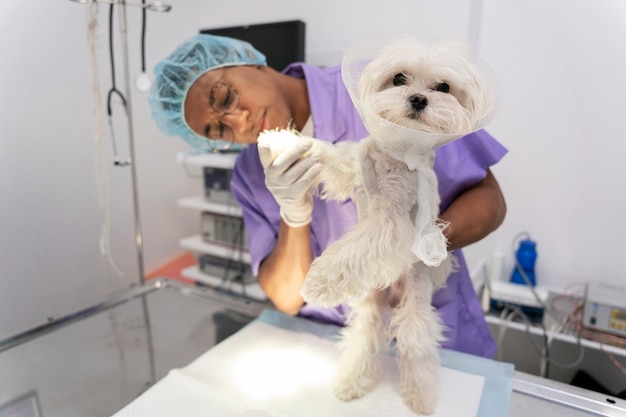What to Expect During Your Pet’s Surgical Procedure in Davenport

What to Expect During Your Pet’s Surgical Procedure in Davenport
When your beloved companion needs surgery, it is natural to feel anxious and have plenty of questions. At St. Charles Veterinary Hospital, we understand how important your pet is to your family, and our veterinary team is committed to making every surgical experience as safe and comfortable as possible. If you are searching for compassionate, expert pet surgery in Davenport, FL, our full-service hospital provides comprehensive care from pre-operative preparation through recovery. In this guide, we will walk you through what to expect during your pet’s surgical procedure at our Davenport location, including details about our thorough pre-surgical exams, anesthesia safety protocols, and how we support your pet’s recovery. Our aim is to give you peace of mind and help you feel prepared for each step of your pet’s surgical journey.
Whether you have been referred to us for routine procedures like spaying or neutering, or your pet needs a more complex surgical intervention, knowing what to expect can make a big difference. Throughout this blog, you will discover how our veterinary surgical procedures in Davenport focus on patient safety, comfort, and ongoing communication with pet owners. We are proud to serve Davenport and surrounding communities with the highest level of veterinary care. If you are looking for a "vet near me" who is dedicated to your pet’s wellbeing, read on to learn more about our approach to pet surgery and how we support you every step of the way.
Recognizing When Your Pet May Need Surgery
It is not uncommon for pet owners to feel uncertain about when a surgical procedure might be necessary for their furry friend. Some surgeries are elective and preventive, such as spaying, neutering, or removing benign growths, while others are required to address medical conditions that could impact your pet’s quality of life. Knowing the signs that may indicate your pet needs surgery can help you act promptly and ensure a better outcome.
Common reasons pets may require veterinary surgical procedures include the presence of lumps or masses, injuries resulting in broken bones or deep wounds, dental disease causing severe pain or infection, and gastrointestinal issues like foreign object ingestion. Other situations where surgery may be advised are when pets develop conditions such as bladder stones, torn ligaments, or internal organ problems that cannot be managed with medication alone. Signs to watch for are persistent limping, swelling that does not go away, difficulty eating or swallowing, unexplained weight loss, or sudden changes in behavior such as increased hiding or vocalization. If your pet displays any of these symptoms, it is important to schedule an appointment with our veterinary team for an evaluation.
When considering pet surgery in Davenport, FL, early detection and prompt action can make all the difference. Our veterinarians will perform a thorough examination and recommend appropriate diagnostics to determine if surgery is the best course of action for your pet’s specific situation.
Understanding the Reasons Behind Veterinary Surgical Procedures
Many pet owners wonder why surgery might be necessary, especially if their pet seems otherwise healthy. Veterinary surgical procedures are performed for a variety of reasons, ranging from preventive care to urgent medical intervention. By understanding the causes and contributing factors, you can make informed decisions about your pet’s health.
Some of the most common causes leading to surgery include genetic conditions such as hip dysplasia or patellar luxation, which may require corrective procedures to improve mobility and comfort. Injuries from accidents, such as being struck by a car or rough play resulting in torn ligaments, often necessitate surgical repair. Tumors or abnormal growths may develop due to age, breed predisposition, or environmental factors and can sometimes be benign but may also pose a risk if left untreated. Dental disease, which is particularly prevalent in both dogs and cats, can progress to a point where teeth need to be extracted surgically to resolve pain and infection.
Additionally, some surgical procedures are performed as preventive measures. Spaying and neutering not only prevent unwanted litters but also reduce the risk of certain cancers and behavioral concerns. In Davenport and the surrounding areas, the warm, humid climate may increase the risk of certain skin growths or infections, making regular check-ups and timely surgical intervention important for your pet’s long-term well-being.
What Happens During Your Pet’s Surgery at St. Charles Veterinary Hospital
When your pet is scheduled for surgery at St. Charles Veterinary Hospital, we want you to feel informed and reassured about every step. Our approach to veterinary surgical procedures in Davenport centers on safety, comfort, and communication, ensuring that you and your pet are supported throughout the process.
Pre-Surgical Evaluation and Preparation
Before any surgical procedure, our veterinarians perform a thorough pre-surgical examination to assess your pet’s overall health. This includes reviewing their medical history, conducting a physical exam, and often recommending bloodwork to identify any underlying conditions that could affect anesthesia or recovery. For older pets or those with chronic health concerns, additional diagnostics like chest X-rays or ECGs may be advised for the safest experience possible.
You will receive detailed instructions about how to prepare your pet for surgery, such as when to withhold food and water. Our team is available to answer any questions, address concerns about anesthesia safety, and explain the procedure so you know exactly what to expect on the day of surgery.
Anesthesia and Intraoperative Monitoring
A top concern for many pet owners is the safety of anesthesia. At St. Charles Veterinary Hospital, we use modern anesthetic protocols and monitoring equipment to ensure your pet’s comfort and minimize risks. Once your pet is admitted, our veterinary team will place an intravenous catheter, administer pre-anesthetic medications to keep your pet calm and pain-free, and monitor vital signs such as heart rate, blood pressure, oxygen levels, and temperature throughout the procedure.
During surgery, a dedicated veterinary professional will be present to monitor your pet continuously and respond swiftly to any changes. This level of attention helps ensure the safest possible outcome, whether your pet is undergoing a routine spay or a more complex abdominal procedure.
Surgical Procedure and Pain Management
Our veterinarians use advanced techniques tailored to each pet’s needs and the specific condition being treated. The length and complexity of the surgery will depend on the nature of your pet’s medical issue, but you can rest assured that we treat every patient with the utmost care and precision. Pain management is a priority, and we employ a combination of medications before, during, and after surgery to keep your pet comfortable and enhance their recovery.
Once surgery is complete, your pet will be monitored closely as they wake up from anesthesia. Our team will provide individualized post-operative care instructions and keep you updated about your pet’s progress throughout the day.
Supporting Your Pet’s Recovery at Home
The recovery period following pet surgery in Davenport, FL is just as important as the procedure itself. Our veterinary team will provide you with clear, step-by-step instructions for caring for your pet at home to promote healing and minimize complications.
Home care recommendations typically include keeping your pet calm and restricting activity for a specific period, preventing them from licking or chewing at the incision site, and administering prescribed medications as directed. You may notice your pet is groggy or less active for a day or two after surgery, but this should gradually improve. Appetite may be reduced initially; however, normal eating habits usually return within a short period.
It is essential to monitor the incision for signs of redness, swelling, discharge, or separation, as these may indicate infection or delayed healing. If your pet is wearing an Elizabethan collar (cone), be sure it stays in place to prevent interference with the surgical site. Our veterinarians will schedule a follow-up appointment to check your pet’s progress and remove any sutures if necessary.
If you have questions or notice anything unusual during recovery, our veterinary team is always available to provide guidance and reassurance. We understand that every pet is unique, and we are committed to supporting you through every stage of your pet’s surgical care.
Preventing the Need for Surgery and Promoting Lifelong Health
While some surgical procedures are unavoidable, many conditions can be prevented or detected early through proactive veterinary care. Regular check-ups at your veterinarian in Davenport, FL help identify issues before they become serious, reducing the likelihood of needing surgery down the road. Our preventive care programs include comprehensive exams, routine bloodwork, dental cleanings, and vaccinations to keep your pet healthy year-round.
Maintaining a healthy weight, providing a balanced diet, and ensuring plenty of exercise are also important steps you can take at home to support your pet’s long-term wellbeing. Environmental safety is key; keep potentially dangerous objects, toxic plants, and hazardous substances out of reach to prevent accidental injuries or ingestions that could lead to emergency surgery.
Establishing a trusted relationship with your veterinary team allows you to address concerns promptly and develop a personalized wellness plan tailored to your pet’s needs. If you are searching for quality veterinary services near me for preventive care or surgical expertise, our Davenport hospital is here to help.
When to Contact Your Veterinarian About Pet Surgery
Knowing when to seek veterinary advice can be challenging, especially if your pet seems only mildly affected. However, prompt action is crucial when you notice warning signs that could indicate a surgical issue. You should contact your veterinarian if your pet develops a sudden limp that does not improve, stops eating for more than 24 hours, vomits repeatedly, has difficulty urinating, or you discover a lump that changes in size or appearance. Unexplained pain, swelling, or behavioral changes are also reasons to schedule an appointment.
For pet owners in Davenport and surrounding communities, our team at St. Charles Veterinary Hospital offers compassionate, expert care for all types of veterinary surgical procedures in Davenport. We encourage you to reach out as soon as you notice any changes in your pet’s health, as early intervention can often prevent more serious complications.
Your Partner in Pet Surgery and Recovery in Davenport
Facing the prospect of surgery for your companion can be overwhelming, but you do not have to navigate it alone. At St. Charles Veterinary Hospital, we are dedicated to providing clear communication, advanced medical care, and ongoing support before, during, and after your pet’s procedure. From the initial consultation to post-operative check-ins, our veterinarians are here to answer your questions and ensure your pet receives the best possible care.
If you are looking for a "vet near me" who is committed to excellence in pet surgery in Davenport, FL, we invite you to schedule an appointment with our experienced veterinary team. Our hospital is conveniently located at 39873 U.S. 27 Davenport, FL 33897, making it easy for families in Davenport and the surrounding area to access quality surgical care for their pets.
Whether your pet needs a routine procedure or more advanced care, our veterinary team is here to offer guidance, expertise, and compassion. Call us at (863) 438-6600 to schedule an appointment or discuss your concerns. We look forward to partnering with you to protect your pet’s health and happiness with exceptional veterinary surgical procedures in Davenport.
Disclaimer: This information is intended for educational purposes only and should not replace professional veterinary advice. Always consult your veterinarian for specific concerns regarding your pet’s health or before making decisions about surgery. For more resources on pet surgery and recovery, you may find additional information at the American Veterinary Medical Association https://www.avma.org/resources/pet-owners/petcare/surgery-your-pet.


















